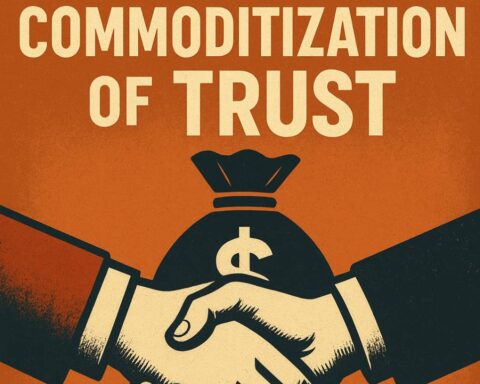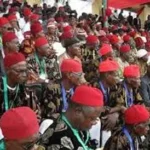By Ademola Tijani
EFCC: An anti-corruption or revenue-generating agency?
The Economic and Financial Crimes Commission (EFCC), initially established to spearhead Nigeria’s fight against corruption, is increasingly viewed as more focused on generating revenue through asset forfeitures and fines than on addressing systemic corruption. Several examples demonstrate how the EFCC’s current practices raise questions about its priorities, methods, and whether it still stands as an effective corruption-fighting body.
In recent years, the EFCC has focused heavily on high-profile asset forfeitures. For instance, cases like the seizure of Diezani Alison-Madueke’s assets have received considerable attention. The former Petroleum Minister, who is accused of large-scale financial impropriety, allegedly acquired multi-billion naira properties and assets with state funds. While the forfeiture of her properties in Nigeria and abroad was swift, her criminal prosecution has been stalled. This example illustrates that while the EFCC is quick to seize and monetize assets, it is less aggressive in pursuing judicial outcomes that would hold powerful individuals accountable.
These selective asset forfeitures suggest that the EFCC might prioritize cases that yield high financial recovery over those that address pervasive corruption issues. The approach raises concerns that the agency could be more interested in financially lucrative cases, leaving behind cases that are more challenging or politically sensitive, even if they have a significant societal impact.
The EFCC has repeatedly resorted to settlement agreements, allowing high-profile suspects to forfeit a portion of their assets rather than face full criminal prosecution. An example is the plea deal arrangement with former officials from the Nigerian National Petroleum Corporation (NNPC), where individuals agreed to forfeit substantial amounts of money and properties as a form of “reparation.” However, they were not held fully accountable in court, avoiding convictions that would serve as a deterrent.
While these settlements contribute substantial sums to government coffers, they undermine the EFCC’s role in delivering justice. Such deals often leave the perpetrators with parts of their ill-gotten wealth, and the lack of prosecution signals a weaker stand against corruption. It creates a perception that wealthy or well-connected individuals can “buy” their way out of legal consequences.
The EFCC frequently publishes figures on the amount of money it has recovered, sometimes in the billions of naira. For example, in a single year, the EFCC claimed it recovered over ₦100 billion in illicit funds. These numbers are used as performance metrics in public announcements and annual reports, presenting the agency as effective based on the financial recovery figures alone.
This emphasis on recovered funds as a primary success metric suggests that financial recovery has become the EFCC’s priority over genuine anti-corruption objectives. By focusing on revenue, the EFCC risks losing sight of its primary purpose: addressing the root causes and networks of corruption. Furthermore, the lack of transparency in how these funds are managed or allocated adds to public skepticism.
The EFCC has increasingly targeted sectors with high financial stakes, like the real estate industry, banking, and foreign exchange markets, for their connection to money laundering activities. High-net-worth individuals and foreign investors who allegedly violate forex regulations or banking protocols often find themselves in the EFCC’s crosshairs. These cases typically result in large financial settlements but do not address more endemic forms of public sector corruption.
While it is necessary to monitor these sectors for financial compliance, focusing primarily on financially lucrative targets hints at a revenue-driven agenda. Real estate seizures, for example, often lead to substantial asset recoveries. However, if the EFCC disproportionately targets high-net-worth individuals, it can overlook cases with lower financial yield but significant public interest, such as systemic corruption in the education or healthcare sectors, which directly impact everyday Nigerians.
One of the most notable examples is the EFCC’s inconsistent handling of high-profile cases involving government officials. In the case of former Secretary to the Government of the Federation, Babachir Lawal, the EFCC began with strong allegations related to fraud and embezzlement of funds meant for displaced persons. However, despite the initial arrest and seizure of assets, Lawal’s case has dragged on for years with no significant progress in prosecution.
The EFCC’s apparent reluctance to complete the prosecution of high-ranking officials suggests that it might prioritize cases that allow for easy asset recovery and avoid cases where the individuals have political connections. This selective approach contributes to the perception that the EFCC is more interested in securing high-profile “wins” that yield immediate financial benefits than in delivering thorough judicial outcomes against corruption.
There is little information on how the funds and assets recovered by the EFCC are managed or utilized. For instance, assets recovered from former governors and officials are often liquidated or handed over to government agencies without clear documentation on how these assets benefit the public. This lack of transparency in the handling of seized assets fuels public concern that the EFCC’s role may lean more towards generating revenue than fighting corruption in a transparent and accountable manner.
Without clear documentation and public accountability, recovered assets risk being reabsorbed into corrupt systems rather than used to promote public welfare. This opacity leads to skepticism about the EFCC’s true intentions, as its financial gains through asset recovery are disconnected from tangible improvements in governance or anti-corruption infrastructure.
While asset forfeiture and revenue recovery are necessary elements of anti-corruption work, the EFCC’s intense focus on these elements has raised concerns that it has transformed into a de facto revenue-generating agency. Critics argue that by emphasizing financial outcomes over genuine systemic reform, the EFCC undermines its mission, erodes public trust, and allows the real networks of corruption to persist unchallenged. A shift in focus to consistent prosecution, transparency, and a more comprehensive anti-corruption agenda could help restore the EFCC’s credibility and refocus it on its foundational mission: eliminating corruption in Nigeria.
Follow us on our social media channels for updates on stories @dailyquery_ for X , @dailyquery for Instagram and @dailyquery for Facebook



























